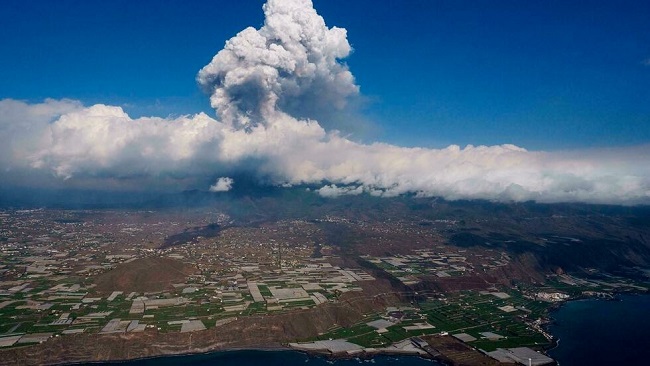Canaries volcano lava reaches sea, raising toxic gas fears
Lava from an erupting volcano in the Canary Islands has reached the ocean, volcanologists said, raising fear of toxic gases being released as the lava hits the sea water.
The regional government of the Spanish archipelago had already declared an exclusion zone of two nautical miles around where the lava was expected to enter the Atlantic and asked nearby residents to stay at home.
“The lava flow has reached the sea at Playa Nueva,” the Canary Islands Volcanic Institute (Involcan) said on Twitter Tuesday night.
La Cumbre Vieja volcano, which straddles a southern ridge in La Palma, an island with 85,000 inhabitants, erupted on September 19, spewing out rivers of lava that have slowly crept towards the sea.
Residents of several areas of Tazacorte, a village near the coast, were told Monday to stay at home to avoid harm from the release of toxic gases that can take place due to a reaction between molten lava and water.
On Tuesday afternoon, the slow-moving lava flow, which has varied in speed over the past few days, even halting at one point, was still around 800 metres (half a mile) from the coast, making it impossible to predict when it would reach the ocean.

Residents were warned to stay home due to “the possibility that there will be a small shock when the magma enters the sea water, and that this small shock causes vapours which can be toxic,” stressed Miguel Angel Morcuende, technical director of the Canary Islands Volcanic Emergency Plan (Pevolca).
Experts say the entry of lava into the seawater will send clouds of toxic gas into the air, causing explosions and a fragmentation of the molten rock like gunshots.
“Inhalation or contact with acid gases and liquids can irritate the skin, eyes and respiratory tract, and may cause breathing difficulties, especially in people with pre-existing respiratory diseases,” Involcan warned.
A state of natural disaster has been declared on the island, where the molten rock has so far scorched its way across more than 258 hectares (640 acres) of land and destroyed 589 properties — not all of them homes, according to the European Union’s Copernicus Earth Observation Programme.

The government earlier Tuesday released 10.5 million euros ($12.3 million) in aid for victims of the eruption, in particular to buy housing for those whose homes were engulfed in lava.
The eruption has forced the evacuation of more than 6,000 people from their homes but has not killed or injured anyone so far.
The island of La Palma lives mainly from the cultivation of bananas and tourism.
Source: AFP





